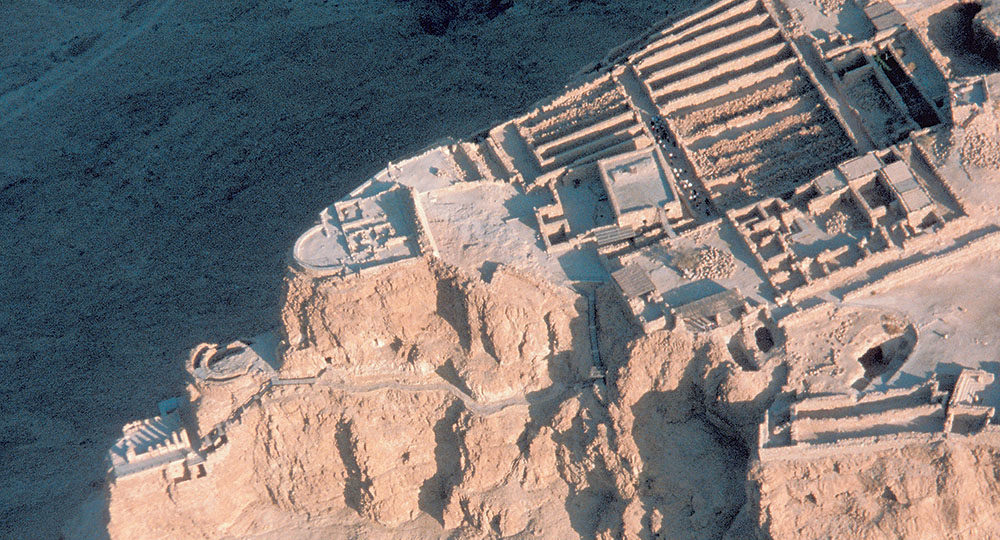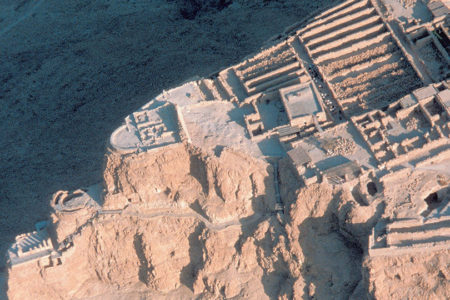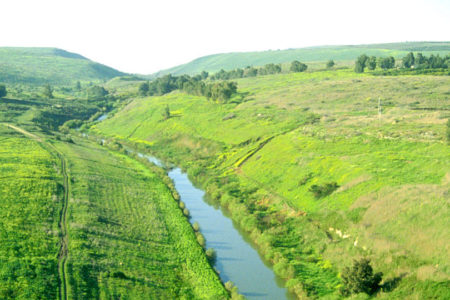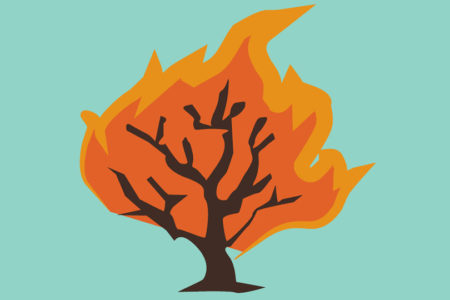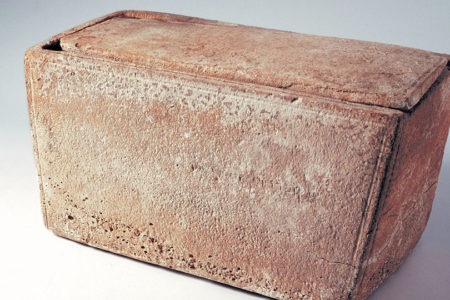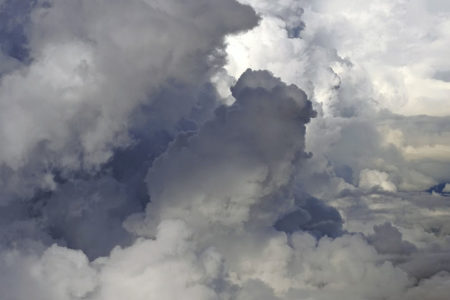Never Forget
Standing on the summit of Masada where the Romans crushed the last remnant of the Jewish rebellion in A.D. 73, one is gripped by multiple impressions. There is the seemingly futile determination of the few Jewish survivors who chose death over capitulation. Yet, by contrast, the still visible Roman siege encampments, wall, and access ramp to Masada’s summit shout of an empire’s commitment to exterminate a people it loathed.
A sense of solemnity exists here, unlike that at any other site in all of the Holy Land. The setting is appropriate. The sun-scorched barrenness of the Judean wilderness falls away toward a lifeless sea shrouded perpetually by haze and heat.
Masada is actually more a cryptic memorial than a site for tourists. It’s almost as though the words associated with the place ride the desert winds: Masada, Never Again. We used to hear that phrase often when people spoke of Israel’s struggle for survival. Now, however, less so.
It is much the same when one walks the paths at YadVashem in Jerusalem, the Jewish memorial to the Holocaust. It’s a place where levity and laughter quickly turn to silence and tears. Once you visit, you are marked with the indelible memory of it. Then there is the unimpeachable evidence not on display. The shrunken bodies; hollow, fear-infested eyes; crematories; and manic sneers of the tormentors imprint images as vivid as the blue numbers the Nazis tattooed on the victims of their atrocities.
Masada, YadVashem, and scores of other places in the world solemnly speak their message to us: “Never forget.” A corollary admonition is, “It can happen again.” And if we ignore the admonition to remember, it will most certainly happen again.
Twenty Centuries Haven’t Made a Difference
From Masada to YadVashem and beyond is a long road. For Jewish people, it has been a road littered with the wreckage of lives, families, villages, and sacred institutions. Hebrews 11: 36–38 tells the grim story:
And others had trial of cruel mockings and scourgings, yea, moreover, of bonds and imprisonment; They were stoned, they were sawn asunder, were tested, were slain with the sword; they wandered about in sheepskins and goatskins; being destitute, afflicted, tormented (Of whom the world was not worthy); they wandered in deserts, and in mountains, and in dens and caves of the earth.
When we made the turn into the new millennium, many held high hopes for a more tolerant, just, and equitable global community. But when our eyes turn from the ancient horrors of the past toward the future, we see that nothing has changed. Nothing has changed, that is, except the technological ability to disseminate hatred and bigotry more quickly, widely, and efficiently. And, oh yes, the art of killing is being perfected in ways that outstrip the gas chambers and firing squads by light-years. Now we can snuff out lives by the millions in the blink of an eye. And with violent anti-Semitism rising swiftly in the Middle East, Europe, and North America, there is justifiable foreboding over what the next few decades will bring.
For true Christians, the story is much the same. The New Testament tells us of the severe suffering first-century believers endured. The emissaries of pagan religions and oppressive tyrannical governments were intent on squeezing the life out of the early church:
And at that time there was a great persecution against the church which was at Jerusalem; and they were all scattered abroad throughout the regions of Judea and Samaria. . . . As for Saul [later he became Paul the apostle], he made havoc of the church, entering into every house and, haling men and women, committed them to prison (Acts 8:1, 3).
Later the streets of Rome will be lighted by the oil-soaked bodies of crucified Christians considered a threat to the empire.
During the aptly named Dark Ages, godly men and women were tied to stakes and publicly committed to the fires by religionists who knew nothing of true and compassionate Christianity.
But, many might argue, that was then; and this is now. Times have changed. But have they?
On January 23, 1999, missionary Graham Staines and his two young sons, Timothy and Philip, bedded down for a quiet night of sleep in their Jeep outside a village in India where Graham was planning to minister to lepers the next day. Sometime after midnight an enraged crowd of Hindus stormed the Jeep, trapped the father and boys inside, and set it on fire. All three were incinerated.
Whether hung on a cross outside a capital city of the ancient world, tied to a stake in an unenlightened time of ignorance and religious aggression, or trapped in a Jeep outside a village in India, the flesh burns just as intensely; and the hearts of those who nail the nails and light the torches are equally degenerate and evil.
The Mandate to Remember
Being, of course, fully aware of mankind’s propensity to forget what should be remembered, particularly the unpleasant, the Lord commanded that memorials be observed annually. For Israel, Passover is an enduring example:
And this day shall be unto you for a memorial; and ye shall keep it a feast to the LORD throughout your generations; ye shall keep it a feast by an ordinance forever (Ex. 12:14).
The Israelites were told to remember Egypt, to remember the bitterness of servitude and slavery, to remember the deaths of the firstborn. And above all, they were told to remember their deliverance through the blood of the Passover lamb. Like Joseph, who never forgot God’s promises and ordered the children of Israel not to leave Egypt without bringing his bones with them to the Promised Land, the Jewish people, too, were to remember and intone annually, over countless millions of Passover tables across the centuries, “Next year in Jerusalem.” But in a very real way, they were also saying, “Egypt, Never Again!”
Few modern commemorations in the world equal Remembrance Day in Israel, held this year on May 6. Remembrance Day reveres the memory of the nearly twenty thousand soldiers and security personnel who have lost their lives since the 1948 War of Independence. Stan Goodenough, a South African Christian living in Israel, aptly described the sensation when, throughout the country, the sirens begin to wail, and life comes to an abrupt standstill:
Loud. Long. Keen. The rising sirens immobilize the nation, paralyzing movement up and down the land. Vehicles stop, their drivers alighting to stand, heads bowed, in the streets. On the sidewalks, in shops, offices, schools, and cinemas, on beaches and playing fields, people stop dead in their tracks.
Life arrested. The world turned to stone. Sirens howl their pain to the skies. And in the howling are a myriad sounds, hard to listen to, impossible to ignore.1
On July fourth, America came to attention to observe its own Remembrance Day of sorts. No sirens sounded, and no one stood beside his car with head bowed in remembrance of the fallen. Instead, fireworks crackled; and triumphal, musical celebrations commemorated the founding of this Republic. But this year should sound another note in the ear of the nation because 130 of our young men and women who crossed oceans to liberate the people of Iraq gave the last full measure of their devotion. And it would be fitting, for all of our celebrating, to hear the sirens wail for them.
I recently drove past Arlington National Cemetery in Washington, D.C. I stopped the car for a moment to gaze across the fields at the neat rows of crosses marking the graves of our fallen heroes. On the drive home, I thought of the white crosses dotting the fields of France and Europe and remembered the terrible price paid to gain and keep our freedom. And without a doubt, that price will be exacted again and again as history unfolds.
What’s the lesson? It’s a simple one that we’ve already heard: Remember! On September 11, 2001, sirens screamed down the avenues of New York City, Washington, and rural Pennsylvania. We must never forget their sounds. Never.
A Word to Christians
Over the past weeks I have visited seven major cities in the United States and Canada doing television appearances. I have been interviewed on more than twenty Christian radio stations and networks on the subject of Christian persecution. The discussion focused on two facts: (1) Ninety-five percent of all Christians worldwide suffer some form of persecution and (2) more Christians are reportedly being martyred for their faith today than at any time in the history of the church.
This being the case, why do most evangelicals seem enshrouded in silence and indifference? The first explanation offered by interviewers and call-in contributors was that those suffering are outside our field of vision. Then there was the opinion that American Christians are so comfortable with the status quo that they recoil at entertaining unpleasant subjects—such as missionaries being summarily executed, decapitated, or burned to death in their cars.
A few even offered this rationale: “After all, the Bible says that if we are believers, we are going to suffer persecution. Jesus said, ‘If they persecute me, they will also persecute you.’ If this is the case, it must be God’s will. So why should we be surprised or try to change things? And, besides, what can we do to make a difference anyway?”
Well, for starters, we are commanded to remember those who suffer persecution:
Remember them that are in bonds, as bound with them; and them who suffer adversity, as being yourselves also in the body (Heb.13:3).
Second, we will be held accountable for our conduct toward suffering saints, at home and abroad:
If thou forbear to deliver those who are drawn unto death, and those who are ready to be slain; If thou sayest, Behold, we knew it not; doth not he that weigheth the heart consider it? And he that keepeth thy soul, doth not he know it? And shall not he render to every man according to his works? (Prov. 24:11–12).
So where do we start? We start by daring to remember. Ignoring the suffering of our brothers and sisters blatantly violates God’s clear command. At the last supper, when our Savior instituted the ordinance of Christian communion, He instructed that it be done “in remembrance of me.” His suffering, death, and resurrection were all to be remembered. “Never forget,” He said, “what I have done for you.”
What did He do? He suffered that we might have life. May we be compassionate and, yes, obedient enough to remember and reach out to those who share in His suffering—all the while remembering that there will never be need to suffer to redeem us again. His suffering alleviated ours and insured for us an eternally better day, one free of blood and tears.
ENDNOTE
- Stan Goodenough, “The Siren Wail,” April 29, 2003, [www.jerusalemnewswire.com/editorial/03/04/030429_siren_wail.asp].
